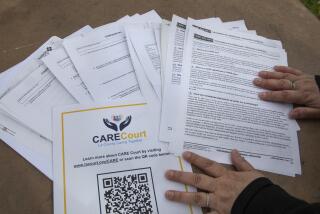Law could be Kelly Thomas’ legacy
It’s hard for me to even think about the horrific way in which Kelly Thomas died. I know too many people like him — lost, sick, disoriented souls who, through no fault of their own, have been hit with a disease that puts them in peril.
Not guilty, came the verdict last week. The two Fullerton police officers caught on camera viciously beating Thomas in 2011 were acquitted of criminal wrongdoing in his death.
Whether you agree or disagree with the jury, there’s plenty of guilt to go around. And either we haven’t learned any lessons from Thomas’ death, or we haven’t acted on what we’ve learned.
“Why was Kelly given a death sentence? Because he was mentally ill, disheveled, unmedicated and in public,” said Carla Jacobs, a mental health advocate in Orange County. She said she has heard from families afraid to call the police when their loved ones are in distress for fear of having them become the next Kelly Thomas.
“The reality,” Jacobs said, “is that our mental health system is complicit in Kelly’s death. It is not geared to protect those with the most serious illness, keep them off the streets and out of cops’ purview.”
“I think the opportunity has come and gone, unfortunately,” said Paul Leon, director of an Orange County homeless services agency called Illumination Foundation.
Leon said there have been isolated improvements in Orange County services, particularly in the city of Anaheim, but the response overall to Thomas’ brutal death and the broken mental health system it revealed has been disappointing. He puts part of the blame on public fear and indifference, which make it difficult to convince communities to approve supportive housing that could keep people off the streets and out of jail.
“When you say ‘mental illness,’ the first thing they think is, ‘Not in my neighborhood,’ ” Leon said.
Jacobs hopes Thomas’ death will give urgency to Orange County’s planned implementation of Laura’s Law, which allows court-ordered involuntary outpatient mental health treatment for those who are severely ill and have had multiple incarcerations or hospitalizations but were refused voluntary treatment.
“If that happens, it will be Kelly’s legacy,” said Jacobs, who added that Thomas might well have qualified for such a program.
Laura’s Law is controversial, but many frustrated families, who despite their best efforts can’t help seriously ill loved ones, believe it could literally be a life saver in some cases.
But the law is aimed at only a small segment of the afflicted population, and there is still a critical shortage of services we know can work for the rest of those with serious mental disorders — outreach, intervention and supportive housing.
Ron Thomas, the father Kelly called for while being beaten unconscious, is distraught by last week’s verdict but is as determined as ever to see public policy changes in his son’s memory.
A former Orange County sheriff’s deputy, Thomas told me he welcomes implementation of Laura’s Law, but he wants more. He wants disciplinary action against police officers to be made public, so violence-prone cops can be weeded out. And he believes, as does Jacobs, that there should be mandatory mental health training for all peace officers.
“I think there should be in-depth training for dealing with the homeless and mentally ill, and it should start in the academy and be part of post-certification,” Thomas said. “And I think it needs to be followed up with continuous training, the way they do with firearms.”
As it is, some law enforcement agencies do better than others. The LAPD has teams of officers who respond along with county mental health workers to calls involving mental illness. So does the Long Beach Police Department, but Chief Jim McDonnell, who is now running for L.A. County sheriff, said state-mandated training is minimal, and he would like to step up crisis intervention training for his officers, especially those on regular patrol.
“The police end up being that entity that deals with them initially, if not entirely,” McDonnell said. It takes a lot of training and experience, he said, to get “a quick read on how to communicate and develop a rapport with people who are in a state of distress. That doesn’t mean that if you request something and they don’t do it, you respond louder and stronger. That may be exactly the wrong thing to do, and it sets them off.”
As important as it is to get the policing right, it’s just as important to remind ourselves that the police can’t fix this problem alone. In fact, extremely sick people are withering and dying on the streets of California throughout the year, quietly and often anonymously, and some of them are veterans.
“There are too many people who are extremely poor, marginalized, deprived and very sick living on our streets. But that’s been the case for 30-plus years,” says Mollie Lowery of Housing Works, which finds housing and treatment for those who live on the streets with chronic mental illness.
They suffer, she said, from the “overt withholding of resources,” forced into “debilitating conditions which further exacerbate their illness.”
And then, when we can’t take it anymore, we lock them up — or try to beat them into submission.
Lowery, and the good people who do what she does, make a huge difference in people’s lives, but there are too few of them to meet the need. And that makes for a double disservice — thousands of suffering souls are out there, living in peril, and although we know how to help many of them, we have not fully committed to doing so.
In Kelly Thomas’ memory, we owe them a better turn.
steve.lopez@latimes.com
More to Read
Start your day right
Sign up for Essential California for news, features and recommendations from the L.A. Times and beyond in your inbox six days a week.
You may occasionally receive promotional content from the Los Angeles Times.







